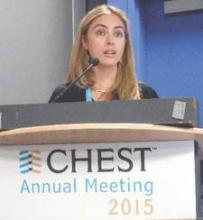MONTREAL – Daily treatment with the antihypertensive drug losartan for a year appeared to slow progression of emphysema, compared with placebo, in a controlled pilot study involving 46 patients at one U.S. center, Dr. Allison Lambert reported at the annual meeting of the American College of Chest Physicians.
One year of daily, 100-mg oral treatment with the angiotensin receptor–blocking drug losartan in patients with emphysema produced a statistically significant regression of the disease in their right-middle lung lobes, compared with progression of right-middle lung lobe disease among control patients, as assessed by CT lung scans. In this lung segment, emphysema regressed by 0.72% in patients on losartan (Cozaar), compared with an average 3.34% rate of progression in patients on placebo.
The losartan-treated patients also showed a consistent pattern of either substantially slowed or reversed emphysema throughout multiple lung segments, although the between-group differences did not reach statistical significance in any other segment, said Dr. Lambert, a pulmonologist at Johns Hopkins Hospital in Baltimore.
Throughout the entire lung, 12 months of losartan treatment was linked to an average 0.32% reduction in emphysema extent from baseline when measured by CT, compared with a 2.18% rate of emphysema progression in control patients on usual care, which just missed statistical significance (P = .064).
Data from other researchers “suggest the right-middle lobe most commonly progresses in emphysema,” which may explain why that lung segment showed the most dramatic effect from treatment, she suggested. Another finding Dr. Lambert found striking was the consistent trend toward slowed emphysema progression in multiple segments throughout patients’ lungs.
Dr. Lambert called this a phase II, “proof of concept” trial. She and her associates have begun a larger, phase III version that will study the effect of 100-mg daily losartan during 1 year of treatment in 220 patients with emphysema, she said. This trial received funding from the Pulmonary Trials Cooperative of the National Heart Lung and Blood Institute.
“These are some of the most interesting and exciting data I’ve seen,” commented Dr. David P.L. Sachs, a pulmonologist who practices in Stanford, Calif., and cochaired the session in which Dr. Lambert gave her report. “Having an agent that could slow progression of emphysema would be unique,” he said in an interview. One aspect that makes this treatment especially attractive is losartan’s extensive safety record as an antihypertensive drug that is also often used to treat patients with heart failure, Dr. Sachs noted.
To put the 100-mg/day dosage used in the current study in perspective, results from a multicenter randomized trial of more than 3,800 heart failure patients published in 2009 showed that a losartan dosage of 150 mg once daily was safe and effective and produced outcomes superior to those seen with a 50 mg once-daily dosage (Lancet. 2009;374[9704]:1840-8).
Dr. Lambert and her associates designed this pilot study because of previously reported results from other groups showing favorable effects of losartan on animal models of emphysema or other lung disease, as well as suggestions from nonprospective clinical studies of benefits from angiotensin-receptor blockers on lung function and on chronic obstructive pulmonary disease (COPD) in particular.
The current study enrolled patients with mild to severe COPD who were current or former cigarette smokers who had at least a 10 pack-year history and were on stable treatment for their COPD. The researchers excluded patients already taking an angiotensin-receptor blocker or angiotensin-converting enzyme inhibitor.
The study included a total of 106 patients with COPD, including the 46 with emphysema at baseline. Their average age was about 58 years old, the enrolled patients included roughly equal numbers of men and women, and about two-thirds were current smokers. All patients underwent CT lung scans at baseline and after 6 and 12 months, as well as other lung function assessments. The study’s primary endpoint was the amount of additional emphysema in their lungs beyond that seen at baseline using CT imaging.
The entire group of 106 COPD patients showed no significant differences in emphysema progression at either 6 or 12 months between the 54 patients treated with losartan and the 52 controls on placebo, but a second, prespecified analysis that focused only on the 46 enrolled patients who had visible emphysema at baseline showed a significant slowing of progression at the 1-year follow-up, Dr. Lambert said.
The study received partial funding from Merck, which markets losartan (Cozaar). Dr. Lambert had no disclosures. Dr. Sachs had no disclosures.
On Twitter @mitchelzoler


